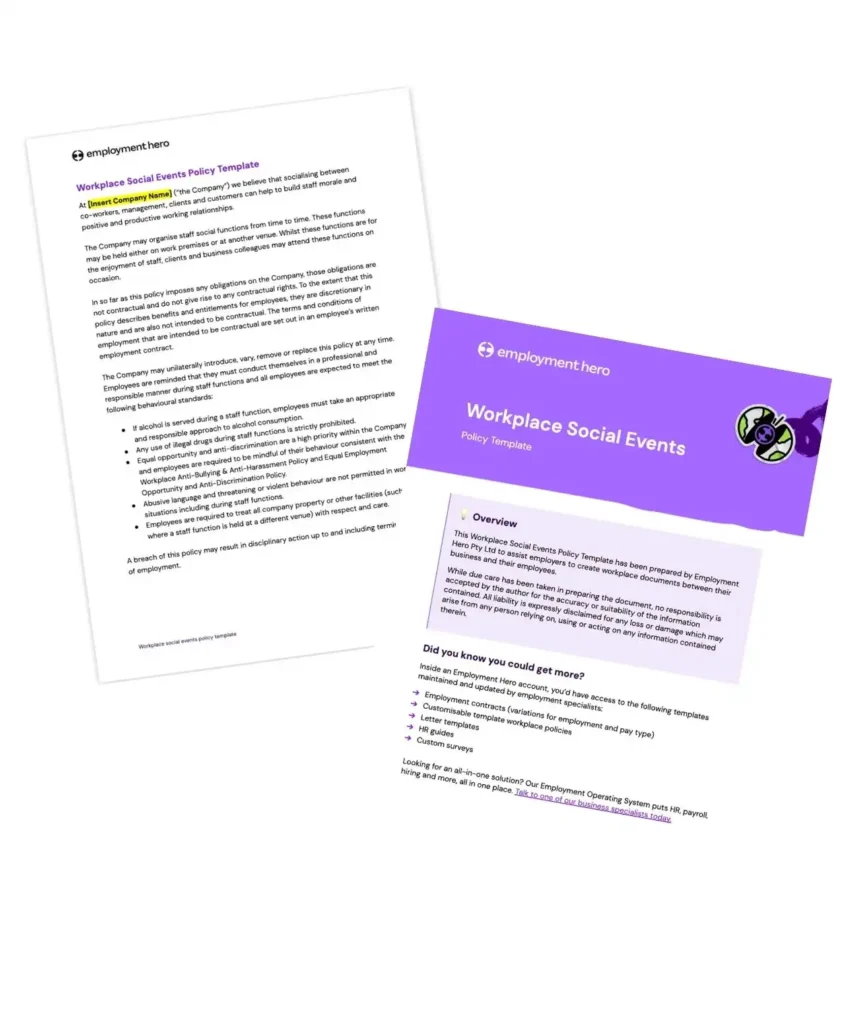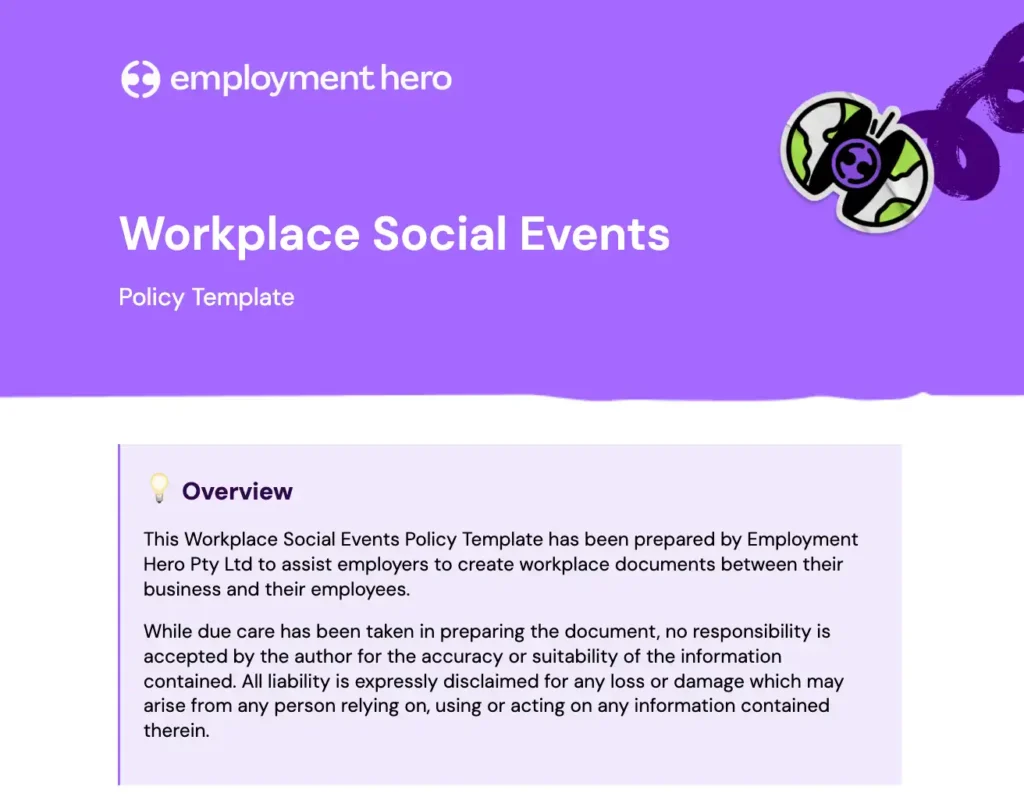Workplace Social Events Policy Template
Published
Workplace Social Events Policy Template
Looking to create clear guidelines for your company’s social gatherings that protect both your business interests and your team?
Your workplace social events policy sets the foundation for enjoyable functions, while ensuring that professionalism remains at the heart of all workplace interactions.

What is a workplace social events policy?
A workplace social events policy is a formal set of guidelines that governs how your company organises, manages and conducts social functions in and outside the workplace. This policy helps establish clear boundaries between employees’ personal lives and their professional responsibilities during company-sponsored gatherings.
It’s your roadmap for ensuring that social activities strengthen your business culture, rather than complicate it. The policy outlines expectations for behaviour, alcohol consumption, social media usage and other key aspects of workplace social interactions.
In Australia, where workplace culture often embraces social connection, having robust guidelines can help prevent potential workplace conflict issues before they arise.

What’s covered in this template?
As a company, you may organise staff social functions that bring your team together in various settings, whether on work premises or at external venues. Whilst these functions are designed for enjoyment, they remain professional extensions of your workplace, requiring clear guidelines on expected behavioural standards and responsibility.
Our fully customisable template gives you the framework to build staff morale and positive working relationships, whilst ensuring everyone is safe and acts professionally.
This template includes:
- What the policy sets out to achieve and why it’s important in the workplace
- The expected behaviour from employees, including specific rules around:
- Alcohol consumption
- Prohibition of illegal drug use
- Respectful behaviour consistent with anti-bullying and anti-discrimination policies
- Prohibition of abusive language, threatening or violent behaviour
- Respect for company property and event venues
- Consequences that may apply for breaching the conditions of the policy
- Related policies that should be read in conjunction with one another
- Employee acknowledgement for team members to sign, confirming that they have agreed to the conditions set out in the policy.
Understanding employee personal conduct
At workplace functions, the line between casual socialising and staying professional can easily blur.
Consider this scenario: A team member shares photos from your company’s year-end celebration on their personal social media account. While meant in good spirits, the images show colleagues in unprofessional situations after excessive drinking. Potential clients viewing these posts might question your business’s professionalism, while other employees might feel their privacy has been compromised.
This example shows why clear guidelines outlining professional responsibility during social gatherings is essential. When developing your policy, focus on helping staff understand that even in relaxed settings, they represent your organisation.
Your policy should address specific Australian workplace contexts, including how employees interact with clients or suppliers who might attend functions, appropriate conversation topics and respectful behaviour that aligns with your company values, even when the event extends beyond normal business hours.
Is employee behaviour the responsibility of the company?
Yes, your company bears significant responsibility for employee behaviour at workplace functions. Australian workplace policy guidelines clearly establish that employers must take reasonable steps to prevent inappropriate conduct, even during social gatherings outside of normal business hours.
This doesn’t mean micromanaging employees’ personal interactions, but rather developing clear expectations and procedures that protect both individual staff members and your business interests.

Are there different rules for the workplace and for business functions?
The core principles are the same for workplace and business functions, but how they’re applied might be a little different.
For example, your standard workplace policy might prohibit alcohol consumption during business hours, but your social events policy would instead focus on responsible drinking at after-hours functions. Similarly, casual conversation topics that might be inappropriate during a client meeting may be acceptable at a team dinner, provided they remain respectful and inclusive.
When employees understand that professional responsibility extends beyond the office, whether at a conference, client dinner or holiday party, they’re better equipped to represent your company appropriately.
Need guidance on developing these nuanced policies for your organisation or facing challenges with managing appropriate conduct at company functions? Our HR advisory service can provide clear procedures for addressing concerns that might emerge during workplace social events.
Keen to see how we can help you manage employment seamlessly? Get in touch with one of our business specialists today to learn more about our Employment Operating System.
Disclaimer: The information in this template is current as at 1 September 2025, and has been prepared by Employment Hero Pty Ltd (ABN 11 160 047 709) and its related bodies corporate (Employment Hero). The views expressed in this template are general information only, are provided in good faith to assist employers and their employees, and should not be relied on as professional advice. The Information is based on data supplied by third parties. While such data is believed to be accurate, it has not been independently verified and no warranties are given that it is complete, accurate, up to date or fit for the purpose for which it is required. Employment Hero does not accept responsibility for any inaccuracy in such data and is not liable for any loss or damages arising either directly or indirectly as a result of reliance on, use of or inability to use any information provided in this template. You should undertake your own research and to seek professional advice before making any decisions or relying on the information in this template.
To download the template, we just need a few quick details.
Related Resources
-
![Manufacturing and Associated Industries and Occupations
Award Summary [MA000010]](https://employmenthero.com/wp-content/uploads/2026/01/Award-Summary_Manufacturing-Industry.webp) Read more: Manufacturing and Associated Industries and Occupations Award Summary [MA000010]
Read more: Manufacturing and Associated Industries and Occupations Award Summary [MA000010]Manufacturing and Associated Industries and Occupations Award Summary [MA000010]
The Manufacturing Industry Award covers employers and employees who work in manufacturing or associated industries.

























